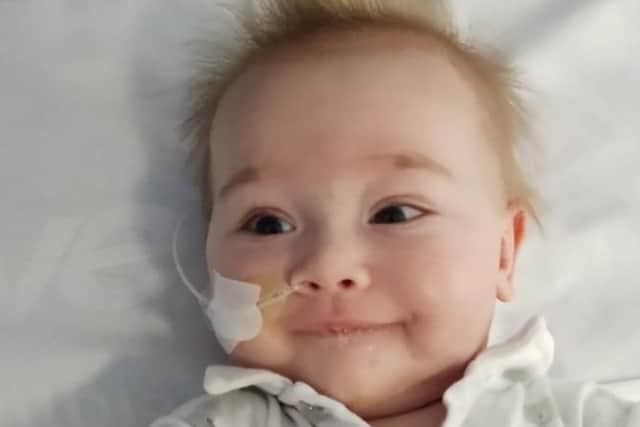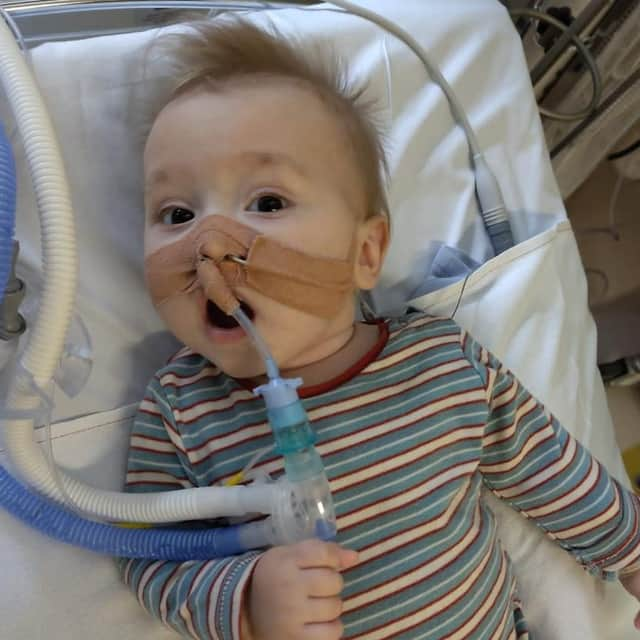Botulism: Baby 'completely paralysed' by extremely rare toxin found in dirt and honey saved
and live on Freeview channel 276
A baby left "completely paralysed" after being diagnosed with botulism has been saved, after he picked up the rare toxin from an unknown source.
Mums Alba and Emily, who did not want their last names used, said they rushed six-month-old Thomas to A&E when he suddenly went "floppy", at home in Birmingham. The youngster's condition initially stumped doctors - leaving his parents frightened.
Advertisement
Hide AdAdvertisement
Hide AdThomas was eventually diagnosed with botulism, which can be found in dust, soil, and honey. Rare in the UK, the condition causes a toxin - which can be deadly - to be released through the body.
In fact, it is so rare that staff at Birmingham Children's Hospital had to source medicine from California. The antitoxin travelled more than 5,000 miles in under 48 hours after rapid customs approval was given.


Thomas is now back at home and is recovering well - and Alba and Emily say they are indebted to the team at the hospital. Emily, a French studies professor, said: “Seeing what they do and how far they go for their patients was life-changing and will stay with us forever."
The mums had already been told to keep a close eye on Thomas by their GP after he showed a lack of energy and unwillingness to feed. So when he became limp in the middle of the night they decided to go straight to hospital. Doctors then told Alba, 36, and Emily, 40, that they believed Thomas was very unwell and were searching for a diagnosis.
Advertisement
Hide AdAdvertisement
Hide AdAlba, a research scientist, said: “Everyone said just how strange Thomas was presenting and that his symptoms didn’t match up.” Thomas was sent for a scan, and shortly afterwards, he was transferred to intensive care, where he was intubated and put into an induced coma.
"Seeing him like that was terrible. It was just so frightening. The next few days were horrendous for us," Alba said. "Thomas declined rapidly and became extremely unwell. He was completely paralysed and we didn’t know if our little boy would wake up again."


Dr Amitav Parida, consultant paediatric neurologist, was the first to suggest that it might be botulism. The disease is caused by botulinum toxin, which is very rarely found in soil and dust and is the chemical used in the production of Botox. Only 20 cases have ever been reported in Britain.
Dr Parida said: “All of Thomas’ symptoms pointed towards botulism, although it was something none of us in the hospital had seen before. However, laboratory tests confirmed we were right.”
Advertisement
Hide AdAdvertisement
Hide AdThanks to the speedy diagnosis, Thomas could now receive tailored treatment - including the antitoxin he needed to cure him. However, infant botulism can only be treated with a human antitoxin, and the only place in the world that created the infant antitoxin Thomas needed was in California.
Staff then spent most of the day coordinating national authorisation for rapid customs approval and courier transfer from the US. The antitoxin arrived within 48 hours and was administered to Thomas.
Emily said: “The pharmacy team did a fantastic job in getting the antitoxin so quickly. Thomas was in hospital for another five weeks while he was recovering, but every day, we saw some progress. It was such a relief for us.”
Thomas’ recovery continues at home, where he has regained most his movement and is thriving with his family. Dr Parida said: “We are so happy to see Thomas doing so well and wish him all the best in his recovery.”
Advertisement
Hide AdAdvertisement
Hide AdLike almost all cases of infant botulism, the cause was not identified. "Botulism is extremely rare but can contaminate soil or food. NHS advice is to not to give honey to babies under the age of one as it's been known to contain botulinum spores."
Comment Guidelines
National World encourages reader discussion on our stories. User feedback, insights and back-and-forth exchanges add a rich layer of context to reporting. Please review our Community Guidelines before commenting.
